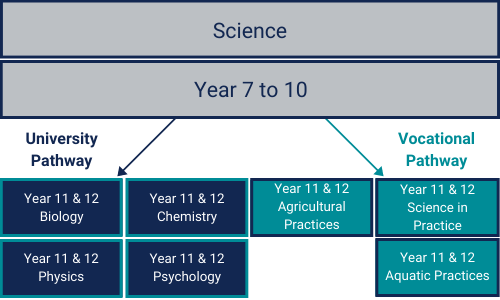Prerequisites
None
Corequisites
N/A
Subject Description
Science in Practice develops critical thinking skills through the evaluation of claims using systematic reasoning and an enhanced scientific understanding of the natural and physical world. Students learn through a contextual interdisciplinary approach that includes aspects of at least two science disciplines — Biology, Chemistry, Earth and Environmental Science or Physics.
Weekly workload in hours
4+ hours
Structure
Module 1: Forensics
This module investigates the scientific methods employed in investigating different types of crimes. Students will explore forensic testing such as DNA analysis, determining unknown substances and crash scene investigations.
|
Module 3: Environmental Sustainability
This module allows students to gain a deeper understanding of the impact they have on the world around them. This will be done by investigating a local waterway, analysing human and natural impacts. |
Module 5: Disease and Biotechnology
In this unit students will study some human diseases and the role of biotechnology in the fight against them. They will study human reproduction and genetics and the medical procedures currently in use to assist with reproductive problems. | Module 7: Microorganisms
The unit investigates procedures in making common food products that utilise microorganisms in their production. Students gain an understanding of the biology and chemistry of microorganisms in the food industry. They create food products, such as cheese, bread, yoghurt and ginger beer in order to learn about useful applications of microorganisms and the importance of following safe work practices as well as recognising industry standards to avid growth of harmful microorganisms.
|
Module 2: Cosmetics
Students will study the world of cosmetics including the science behind cosmetology, dermatological care, hair care and other relevant beauty products. Students will create various cosmetics in the laboratory and explore the standards that Australia is required to meet in comparison to other countries. Students will also study the environmental effects of some cosmetics, along with organic and natural branded products.
| Module 4: The Future of Space Science
This module focuses on past and future advancements in space travel, including continuous improvements in materials and technology.
| Module 6: Off the Grid (Renewable Energies)
Students will investigate various energy sources and critically analyse pros and cons for the modern world. They will explore differing forms of energy conversion and make recommendations of energy requirements and design of Australian households based on environmental impact, resource availability and sustainability.
| Module 8: Sports Science
This unit investigates the variations and advancements in materials and surfaces for use in sport, the laws of physics involved and the factors effecting sporting performance.
|
Assessment
Module 1 - Collection of work
Complete a series of tasks based on different crime scenes and forensic techniques.
| Module 3 - Investigation
Investigate a waterway's health by conducting various tests at various points. Analyse the findings, assess the conditions surrounding them and write a report providing conclusions and recommendations on the waterway's overall health and how to sustain it into the future.
|
Module 5 - Project
Response to a stimulus from a news article highlighting a disease.
|
Module 7 - Collection of work
Students will investigate and implement methods of making a product using microorganisms with the intention of maximising yield for lowest cost.
|
Module - Project
Design, manufacture and market a cosmetic product and present information about this product to a Shark Tank style audience.
|
Module 4 - Extended response
An extended response to a stimulus which addresses the design process of a rover, how and why this design was chosen.
| Module 6 - Project
Students will design and build energy efficient model houses for the purpose of evaluating current and future designs when considering energy efficiency, resource availability and environmental impact.
| Module 8 - Investigation
Students are required to investigate the effect of materials or surfaces on sporting performance.
|
